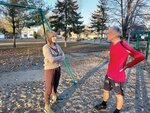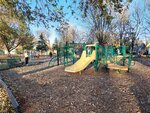By Cam Gordon
The community objection to the Minneapolis Public School (MPS) district’s announcement to demolish the playground at the now-closed Cooper school convinced the district to delay the demolition until spring. Now residents are working to save it for the long term.
At a meeting on Nov. 2, 2023 at Howe Elementary School, Interim Superintendent Rochelle Cox, School Board Commissioner Lori Norvelle and Assistant Superintendent Ryan Strack shared their perspectives and listened to concerns of an estimated 100 people. Also attending were Park Board Commissioner Becky Alper, Ward 12 Council Member Andrew Johnson, State Representative Samantha Sencer-Mura, and Ward 12 Council Member-elect Aurin Chowdhury.
The district announced their plans to remove the playground on Oct. 3 via an email from Strack.
“Following complaints about the condition of the equipment,” wrote Strack in an email sent to the Longfellow Community Council (LCC) Executive Director Rachel Boeke, and others, “Minneapolis Public Schools conducted an inspection of the playground at the unused Cooper School at 32nd St. and 45th Ave. To prevent any accidents or injury for the public using the equipment, it has been determined that the equipment should be removed as soon as possible, and this process will occur in the coming weeks.”
Those inspections, conducted in May and September of 2023, found that the playground’s overall condition was poor. The 26-year-old equipment, the inspections report said, was “showing signs of aging.” It noted deteriorating paint and protective coatings, a rusting and “dangerous” hanging walkway bridge, and sand that does not meet industry standards for fall protection. “Based on age and condition,” it said, the “playground equipment should be taken out of service.”
“Since the school is not being used, there are no plans at this time to install a new playground and due to the age of the playground, repair was not a feasible option. Beyond those who shared safety concerns about the condition of the playground, MPS is not entirely aware of the usage and any impact this may have on the neighborhood, but having unsafe equipment is not an option,” added Strack.
SURPRISED NEIGHBORS FORM PLAYMPLS
“I was very surprised to hear that MPS was suddenly removing the playground,” said Lisa Priest. “Sure, it’s a bit old, but by no means in such disrepair that we felt uncomfortable playing on it.”
Priest and her family live within two blocks of the playground. Her children attend the Bethlehem Child Care Center at 3141 43rd Ave. S and they use the playground often. She is also one of the volunteers leading the work to save the park. “I think the way that MPS made the announcement – that it was to be completely removed in 1-2 weeks – was not the way to go and they had to walk that back a bit, clearly,” she said.
Priest appreciates that the district is giving the community time to explore alternatives. “I want to not make it out to be MPS versus the community,” said Priest. “They’re in a tough spot with funding and the situation, and I want to be able to continue to work with them as partners.”
Bill Baldus lives across from the playground and recalls when equipment was installed in 1996. He agrees that it could use some repairs, but does not want to see it removed. “It’s a real gem,” said Baldus. “It would be tragic if they tore it down.”
Priest and others have formed a group called PlayMPLS dedicated to saving the playground. On their website, they describe themselves as “a small grassroots group of parents thinking about the future of the Cooper Elementary playground and surrounding fields, as well as the future of all Minneapolis Public Schools outdoor play areas. Preservation through rehabilitation, or well-considered replacement if needed, can help keep the Cooper playground a community gathering place for kids, teens, and parents for years to come.”
NEXT MEETING NOV. 28
Priest is working with LCC in planning the next meeting that will be held at 7 p.m. Nov. 28 at Bethlehem Covenant Church. There will also be an online option for people to use to join. This meeting will be hosted by LCC for all community members who want to help preserve the park. There Priest expects to discuss fundraising, forming work groups and creating both short- and long-term strategies for saving and improving the playground.
The district has indicated a willingness to lease the land to another group but not to pay for the repair or replacement of the play equipment. Boeke said that LCC is open to being a fiscal agent for another nonprofit organization set up to preserve and improve the playground, and that they may be open to leasing the property. They currently lease a small “community hops garden,” providing liability insurance through a memorandum of understanding with a nonprofit group who manages the garden. Although it is a smaller space and not open to the public, it offers a potential model that could be considered.
WILL MPS MAKE SMALL FIXES?
Priest isn’t ruling that option out. For the short term, she advocates appealing to the school district to address safety issues. In the inspection reports, the district noted three high priority items that needed repair. “The hanging walkway should be removed, and access boarded up,” she said. The other two high priorities are adding sand and fixing the chains on the swings. “If MPS could replace these tiny items, it would give the community enough time to work on a new solution,” she said. “Our tax dollars already pay for MPS and parks. Why should we have to pay for it?”
Priest also thinks that funding strategies need to be developed for long-term. “We have two ways to go,” she said. “Either look to the state and city for funding for our playground as well as the other playgrounds in danger or already removed, or look to just focus on Cooper using community resources and fundraising.”
MPS closing other parks
Becky Alper, one of the MPRB commissioners representing the area, sees this as part of a bigger problem and bigger opportunity. She supports efforts to preserve playground access across the city and believes that allowing school playgrounds to close is antithetical to the city’s aspirations to attract and retain young families.
She said that the removal of the playground at Tuttle school in the Southeast Como neighborhood and potential removal of other school playgrounds at Lincoln and Hamilton schools on the northside indicate this is a bigger problem.
“I think we are moving in the wrong direction,” Alper said. “The park board should work with a coalition of jurisdictions – with our partners at the county, city and state to save these parks.”
At the Oct. 18 Park Board meeting, Alper tried to amend a resolution that grants a permanent easement so that the city could use park property for a storm water management project. As part of the agreement with the city, they would pay fees that would go into a land acquisition fund. Alper moved to amend the proposal to use the fee revenues to establish "a new fund specifically to be held as matching funds for city, county, regional, philanthropic, and state funds to address the issue of loss of MPS playgrounds and fields.”
The amendment outlined several reasons why the park board should create the new fund. “Minneapolis Public Schools is seeing declining enrollment and related financials issues, leading to the closure of school facilities throughout Minneapolis,” it said. “Many of these closed MPS facilities have park-like features including playgrounds and fields.” It went on to note that “in 2023 MPRB was ranked #3 park system in the country by Trust for Public Land based on the inclusion of many of these at-risk facilities in the calculation of MPRB’s Park Score;” that Minneapolis is seeking to become a candidate for UNICEF’s Child Friendly Cities Initiative; and that a “net loss of playgrounds and fields across the city would make Minneapolis less child-friendly.”
“I think there is a storm brewing across the city with places that are not official MPRB property but with properties we have used in our calculations of our park score and that the people, basic citizens of Minneapolis, use and consider to be parks,” said Alper.
While the amendment didn’t pass, it generated discussion and clarified that even without the amendment the land acquisition fund could be used to acquire properties such as Cooper’s playground and field.
If and how MPRB might assist with the effort to save the Cooper playground is yet to be determined.
‘WHAT’S OUR MESSAGE TO FAMILIES?’
According to Boeke, Priest, Baldus and Alper, no one has come forward voicing opposition to saving the playground, but without someone coming forward to insure and maintain it, that may be impossible.
“What’s our message to families?” asked Alper. “If we want them to stay and if we want to attract new young families to our city, removing playgrounds is not what we should be doing.”
“Being able to have the space accessible, especially to families with young children is important,” said Boeke, adding that she is open to considering “anything LCC can do to save the playground.”
Who shows up and what happens on the 28th will help determine the playground’s future.
“Come join the meeting. Join a committee,” said Priest. “We need so much help.”



Comments
No comments on this item Please log in to comment by clicking here